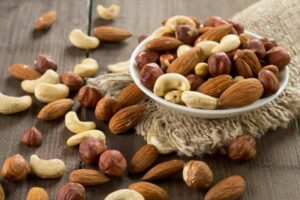5 Foods You Shouldn’t Eat with Dentures
June 4, 2025

Wearing dentures can restore your ability to chew, speak, and smile confidently, but adjusting your diet is part of maintaining their function and longevity. While dentures are designed to handle normal biting and chewing, certain foods can cause discomfort, damage the appliance, or increase the risk of oral health issues. Knowing which foods to avoid can help you enjoy a more comfortable and lasting experience with your dentures.
Here are 5 types of foods you should steer clear of when wearing dentures:
1. Sticky Foods
Sticky foods like chewing gum, caramel, taffy, and certain candies can cling to your dentures and pull them out of place. Not only does this cause discomfort and embarrassment, but it can also weaken the bond between the dentures and your gums. Sticky foods are also difficult to clean off the denture surface, which increases the risk of plaque buildup and bad breath.
2. Hard or Crunchy Foods
Crunchy items like popcorn, nuts, hard candies, raw carrots, and corn on the cob can crack or dislodge dentures. These foods often require strong biting forces, which dentures aren’t built to withstand like natural teeth. Hard foods can also put pressure on your gums, causing sore spots or irritation under the denture.
Tip: If you enjoy crunchy vegetables, try steaming or cooking them until soft.
3. Tough Meats
Steaks, jerky, and other tough or chewy cuts of meat can be difficult to break down with dentures. The repetitive chewing can cause sore gums, and food may get stuck under your dentures, causing discomfort or infections.
Tip: Opt for softer protein sources like ground meat, slow-cooked dishes, or fish, which are easier to chew and gentler on your gums.
4. Seeds and Small Grains
Sesame seeds, poppy seeds, chia seeds, and small grains like quinoa can easily get trapped under your dentures or in the space between the denture and your gums. This may lead to irritation, sores, or infections if not thoroughly cleaned out.
Tip: Choose breads or crackers without seeds and rinse your mouth and dentures thoroughly after eating.
5. Hot Foods and Beverages
Dentures insulate your mouth, which can make it harder to detect extreme temperatures. This raises the risk of burning your mouth when consuming hot coffee, tea, soups, or oven-fresh dishes. Hot foods can also warp the shape of some denture materials over time.
Tip: Let hot items cool slightly before consuming and test the temperature carefully.
Living with dentures doesn’t mean you have to give up all your favorite foods, but making thoughtful choices will go a long way in protecting your oral health and your appliance. Choose soft, denture-friendly foods, cut items into small pieces, and chew slowly and evenly on both sides of your mouth.
About the Author
Dr. Sowmya Kumar is a graduate of the University of Florida College of Dentistry. A lifelong learner, she has committed herself to continuing education by participating in advanced training courses while also contributing to academic journals and various research papers. Are you interested in a durable and tried-and-true solution to missing teeth? Dr. Kumar and our team can outfit you with a custom prosthesis to give you your life back! Schedule your appointment online or call us at (321) 631-4334.
No Comments
No comments yet.
RSS feed for comments on this post.
Sorry, the comment form is closed at this time.

